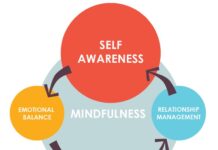Mindfulness and Inner Growth
Mindfulness is a contemplative state of mind that cultivates self-awareness. High self-awareness enables people to evaluate their own behaviors objectively, regulate their emotions, and align their actions with their values. They also have a greater understanding of how others perceive them.
Mindfulness is a contemplative state of mind
Mindfulness is an important part of Buddhist spiritual practice. It entails bringing one’s awareness to the present moment. Meditation and yoga techniques are often associated with mindfulness. However, many practitioners have also adopted mindfulness practices in secular settings. Buddhist texts and traditions have long emphasized the importance of mindfulness, but it has also found its way into modern Western society. In recent years, many non-Buddhist organizations have been incorporating it into their programs.
Mindfulness is a state of mind in which one is aware of what is going on in the present moment, without judgment. For example, when you’re with someone, being mindful means being present with them. This means being fully aware of their experience and identifying their feelings. In turn, you may feel genuine kindness and compassion toward them. It can help you avoid self-criticism, and it can help you deal with difficult feelings.
A practice of mindfulness is simple, and can be practiced in any environment. It can be as simple as feeling the water on your skin while showering, or as complex as focusing on the sensations in your body while brushing your teeth. You can even focus on your breath for a few minutes each day. The possibilities are limitless.
Practitioners often refer to mindfulness as the act of paying attention to the present moment, and it is associated with meditation. A good place to find a concise definition of mindfulness is a dictionary. Synonyms of mindfulness include alertness, care, circumspection, consideration, and diligence.
It cultivates self-awareness
Self-awareness is the ability to evaluate your strengths and weaknesses. Many people lack this vital skill. When you’re focusing on the right things in life, you can make rational decisions. Your focus on the present moment can help you identify your own strengths and qualities.
Aside from helping you focus on the present, mindfulness can also help you deal with stressful situations. It helps you calm your mind and prevent you from overthinking and over-emotionalizing. It also allows you to choose your response to difficult situations. It enables you to take a more objective view of the situation.
Self-awareness is a critical component of inner growth. People who are highly self-aware are able to evaluate their own behavior in the context of their own values. By developing self-awareness, you can learn to regulate your emotions, make more informed decisions, and understand how others see you.
Mindfulness training helps you become more aware of yourself and other people. You’ll learn to identify unproductive thought patterns and self-talk patterns. This can help you become more assertive, solution-oriented, and aware of your biases. Mindfulness training also helps you to recognize your own patterns of thinking and behavior, which are often unconscious.
In practice, the process of observing and noticing your own thoughts and emotions leads to a deep sense of inner peace and nourishment. This state will help you to recognize your own worth and value, regardless of external circumstances. It’s not something that can be cultivated overnight. It’s a process that requires regular mindfulness practice.
It reduces emotional reactivity
Mindfulness and inner growth are psychotherapeutic practices that teach participants to observe and be aware of their current state of mind. Although the exact neural mechanisms behind these practices are still largely unclear, recent scholarship has established that they may have a range of positive effects, including reducing emotional reactivity. In a recent study, Yanli Lin and colleagues looked at the effects of mindfulness on event-related potential brain signals, which are associated with emotion regulation.
The researchers studied two groups of participants. One group was given mindfulness instruction, while the other was not. The groups did not differ in their mindfulness practices, but they did experience a reduction in late sustained LPPs, which are a measure of emotional reactivity to negative stimuli.
Mindfulness can help reduce emotional reactivity and increase the ability to choose our response to stressful situations. Mindfulness helps us develop an awareness of our thoughts and emotions, and it also helps us break negative patterns. It also helps us see situations objectively, which allows us to choose how to react to them.
Mindfulness training has also been shown to improve physical and psychological health. These benefits may be due to the fact that the training teaches us to experience and accept our feelings without judgment. Consequently, it should help us recover more quickly from negative emotional states. However, these positive effects of mindfulness training have been studied only in theory, and more research is needed to confirm them.
It improves health
Meditation and mindfulness practices have many benefits for health, including physical and psychological benefits. Mindfulness practices have been shown to be effective at reducing the stress and anxiety that is common in today’s world. The practice of mindfulness involves focusing on the present moment and the sensations in the body. It involves various tools and techniques that improve the way we think and act.
Mindfulness practices are often part of modern psychotherapy and can significantly improve one’s mental, emotional, and physical health. Among other benefits, they can improve one’s ability to focus, improve concentration, and improve their self-concept. They can also reduce the amount of pain a person feels.
The ability to be more aware of oneself and others is an important aspect of mindfulness. People who are more aware of their thoughts and feelings are able to evaluate themselves more objectively. Ultimately, this allows them to make more informed decisions and better handle difficult situations. These people are more capable of understanding others, reducing the risk of misunderstandings and conflict.
People who regularly practice mindfulness report feeling less stressed and more patient. They are also more patient and kinder. When you’re feeling less stressed and anxious, you’re more likely to enjoy life and others more. The benefits of practicing mindfulness are vast. It’s easy to find ways to practice it wherever you are. Just start with a simple exercise.
It improves relationships
Mindfulness and inner growth improve relationships through improved communication, self-awareness, and receptivity. When we practice mindfulness, we can better understand our own feelings and emotions, which protects us from the negative emotional effects of conflict and relationship stress. Mindfulness also helps us to be more compassionate and accepting of others, which makes relationships better.
Mindfulness is a practice that involves paying attention in the present moment, observing and being non-judgmental. It can be a simple practice of taking a few minutes each day to focus on your breath and your surroundings. It can also be a powerful tool for improving your relationships, whether they’re personal or professional.
Mindfulness research has shown that people who regularly practice the art of mindfulness and inner growth have more positive relationships. However, the mechanisms behind this association are unclear. Nevertheless, this study bridges the gap between implicit theories of relationships and mindfulness by demonstrating that more mindfulness is associated with better relationships. It also suggests that mindfulness can improve the quality of relationships and improve overall wellbeing.
Mindfulness improves relationships by boosting relationship satisfaction. However, it does not work for all types of relationships. Couples who are high on self-esteem and trust do not experience the relationship satisfaction boost from curiosity.
It improves well-being
Mindfulness is a powerful practice that can improve your mental health and wellbeing. It is also an important element of treatment for many ailments. It can be practiced at any time or place, such as while eating, walking, or showering. It requires you to engage all of your senses and be aware of everything you experience.
Mindfulness training can be very beneficial for workplaces, particularly those that focus on employee health. Not only does it help employees reduce stress and increase productivity, but it also helps employers lower their healthcare costs. A recent study conducted by Aetna found that employees who practice mindfulness at work showed reduced stress and increased work output.
Mindfulness has been shown to improve health and reduce cardiovascular risk. It has also been associated with a lower BMI, increased physical activity, and a reduced smoking habit. Studies have also shown that mindfulness helps people develop healthy habits. A systematic review of studies on the subject has concluded that mindfulness is an effective adjunct treatment for coronary artery disease.
Researchers also studied the effects of mindfulness training on cancer patients. They found that mindfulness training increased the activity of T-cells in breast cancer and HIV patients. These findings suggest that mindfulness might help cancer patients fight back. Some biomarkers for cancer progression have also been improved after mindfulness training.














